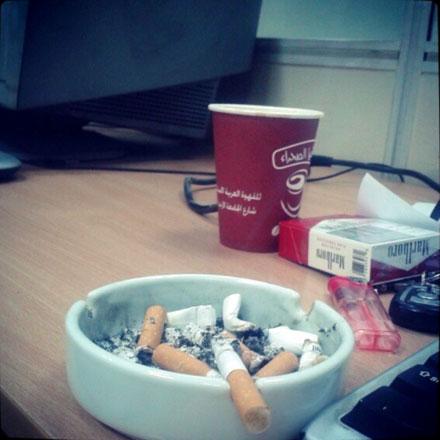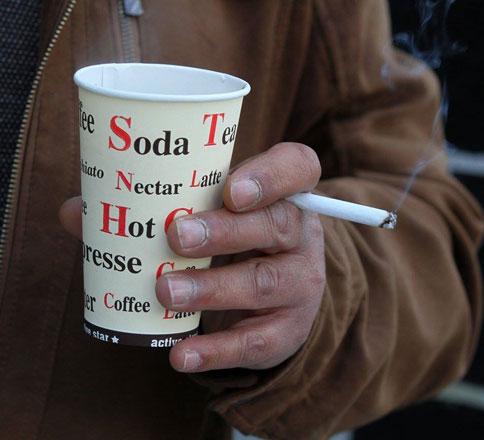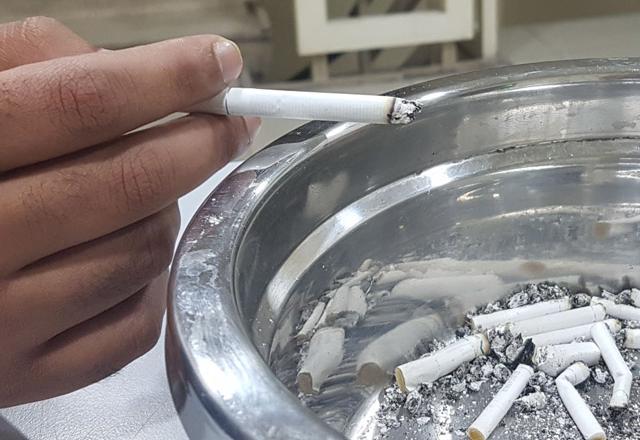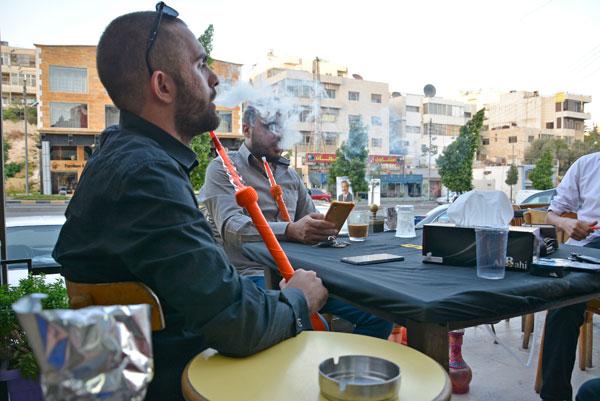You are here
Public Health Law not up to the challenge of curbing smoking — experts
By Dana Al Emam - Feb 11,2016 - Last updated at Feb 11,2016

The anti-smoking law has not been effective enough to curb smoking, experts say (JT photo)
AMMAN — In the eight years since the Public Health Law was passed, it has not risen to the challenge of curbing smoking in public areas, according to experts in the field.
The issue lies not only in "poor" law enforcement, but also in "lenient" penalties, they noted.
Under the Public Health Law, smoking is prohibited in hospitals, healthcare centres, schools, cinemas, theatres, libraries, museums, public and non-governmental buildings, public transport vehicles, airports, closed playgrounds, lecture halls and any other location to be determined by the health minister.
The law also stipulates that any person caught smoking in a public place is subject to between one week and one month imprisonment or a JD15-25 fine. The same penalties apply to those who sell cigarettes to minors.
Despite some successes, the implementation of the law in governmental agencies and a majority of private institutions offering public services remains "very far" from what the law entails, said Feras Hawari, director of the cancer control office at the King Hussein Cancer Centre.
"Institutions should take the initiative to ban indoor smoking if the government fails to do so," he told The Jordan Times in a recent phone interview, noting that inspection and issuing violation tickets does not fully solve the problem.
Secondhand smoking increases non-smokers' chances of developing cancer and heart diseases by 30 per cent, said Hawari, noting that banning smoking in public areas proved to be the most effective method for decreasing smoking rates by 4-5 per cent over a period of two years.
Meanwhile, he attributed the "weak" law enforcement to the lack of comprehensive and firm adoption of the World Health Organisation's (WHO) MPOWER strategy, which provides a comprehensive set of tobacco control measures.
Jordan's national tobacco control strategy 2016-2018, which will be officially launched on May 31 next year to mark World No Tobacco Day, is to be based on the MPOWER strategy, according to previous official remarks.
Hawari sees a chance to accelerate anti-tobacco efforts in a "firm" implementation of the strategy with the support of decision-makers.
For her part, Larissa Al-Uar, a founding member and secretary of the Tobacco Free Jordan society, said anti-tobacco awareness campaigns must be designed to alter people’s behaviours and perceptions of smoking, in addition to law enforcement.
“Anti-tobacco efforts will only succeed when they become a popular demand that people advocate to protect their right to a healthy life,” she said, calling for intensifying penalties on violators as well as equal and systematic law enforcement.
Last month, Prime Minister Abdullah Ensour expressed his keenness on combating smoking through action, resolutions and guidance, citing some 1,550 smoking-related deaths every year in Jordan.
The premier’s remarks indicate the government’s willingness to fight smoking in public areas, said Al-Uar, yet regulations must rise to the challenge of protecting the health of future generations.
Although Article 54 of the Public Health Law bans promoting and marketing all types of tobacco products, many cafés and restaurants find in social media outlets a suitable medium to announce their offers on waterpipe, she said.
To address the issue, the Health Ministry has recently proposed an amendment to the law to entail stricter penalties on violators, particularly regarding marketing tobacco products, said Malek Habashneh, head of the ministry’s awareness directorate.
He added that suggested amendments to the legislation, which are currently under deliberation at the Lower House Health Committee, increased fines on those caught smoking in a public place from JD15-25 to JD100-200.
Furthermore, a suggested amendment increased the penalty for promoting and advertising tobacco products from JD500 to JD5,000, including advertisements via social media outlets.
He added that two businesses were recently referred to court for violating the tobacco promotion article, one for designing a cake in the shape of a waterpipe and the other for selling illegal electronic cigarettes.
Jordanians’ annual consumption of cigarettes is estimated at around 1.7 million cartons at a cost of more than JD0.5 billion.
Around 34 per cent of Jordanians between the ages of 13 and 15 consume tobacco, while over 40 per cent of individuals within the same age group have tried tobacco products, according to WHO figures.
According to Health Ministry figures, cancer prevalence rates in Jordan reached 78.5 cases per 100,000 residents, a “low” figure compared to the global rate of 133.4 cases per 100,000 individuals.
A total of 5,013 cancer cases among Jordanians were registered out of an overall number of 7,454 cases recorded by the Jordan Cancer Registry in 2012, according to a ministry statement.
Breast cancer was the most common among Jordanians (1,008 cases), followed by colorectal cancer (567), lung cancer (371), lymphoma (327) and bladder cancer (246).
“We cannot offer to give up in the fight against tobacco… giving up would lead to a disaster,” Hawari concluded.
Related Articles
AMMAN — Although he has been a smoker for the past 17 years, Abdullah Akayleh had more than one reason to benefit from Ramadan’s long fastin
AMMAN — On the occasion of the World No Tobacco Day on Wednesday, health sector stakeholders pledged “firm implementation” of the Publ
AMMAN — Only 28 per cent of argileh (water pipe) smokers in Jordan want to quit, compared to over 70 per cent of cigarette smokers, a health


















